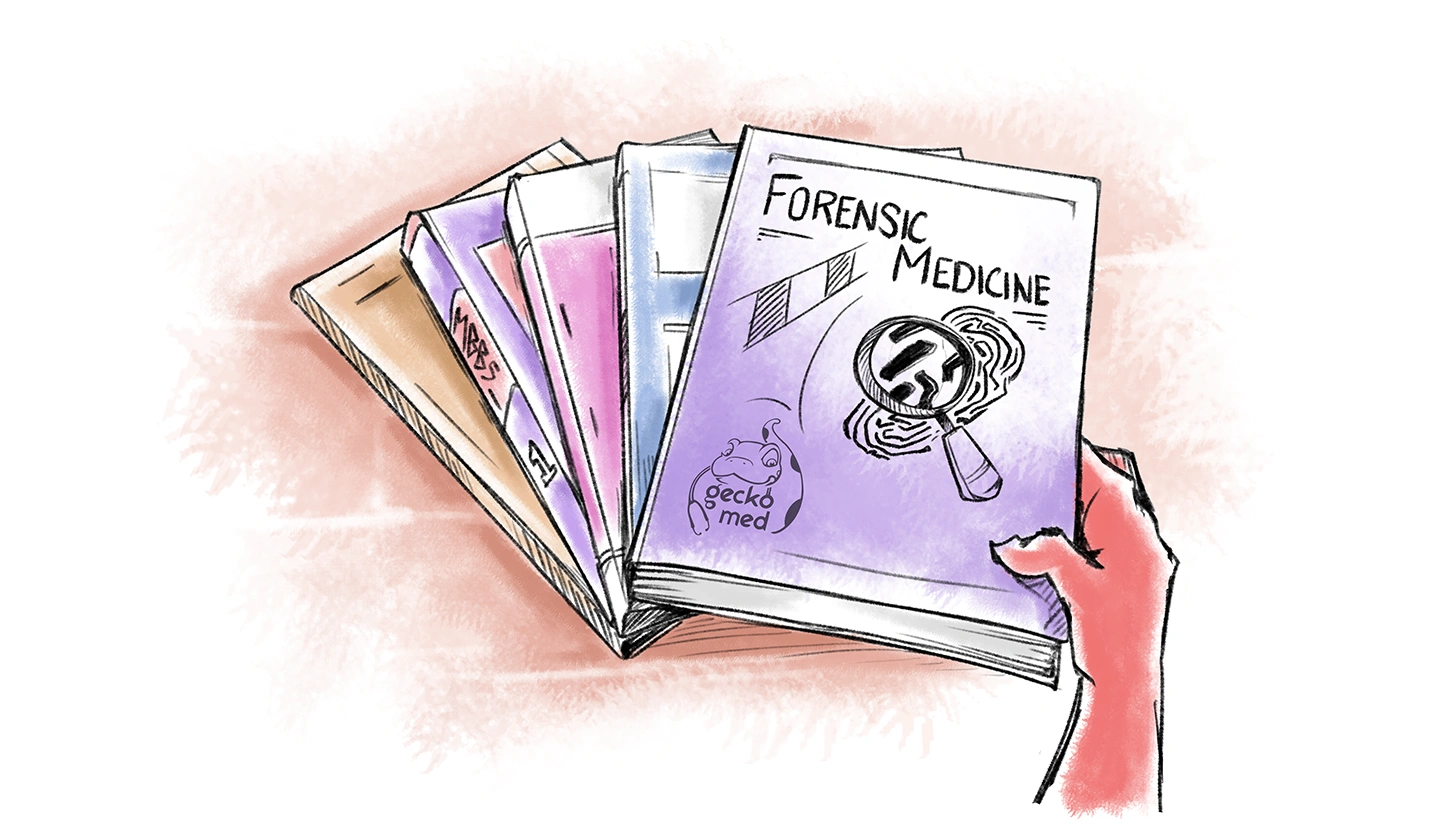Forensic medicine is the branch of medical science that applies medical knowledge to solve legal issues.
It plays a vital role in both criminal and civil law, where medical expertise is used to determine causes of death, assess injuries, and understand the effects of toxic substances.
For MBBS students, forensic medicine presents an interesting yet challenging subject that combines clinical knowledge with legal principles.
To master the subject, it is crucial to have the right resources—books that are comprehensive, easy to understand, and detailed.
In this guide, we will explore a curated selection of forensic medicine books suitable for MBBS students.
These books are categorized according to their purpose—whether you’re looking for basic understanding, in-depth studies, or practical clinical applications.
Whether you are preparing for exams, developing your clinical skills, or seeking a deeper understanding of forensic science, this guide will help you find the best resources.
Forensic Medicine Books for MBBS: Books for Basic Understanding
These books provide a comprehensive overview of the subject, covering fundamental concepts and principles.
“Forensic Medicine and Toxicology” by P. V. Guharaj
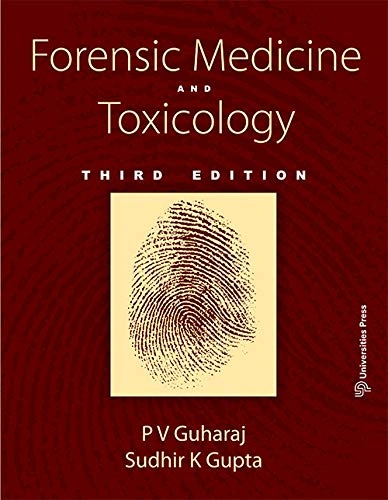
One of the most recommended books for beginners in forensic medicine is “Forensic Medicine and Toxicology” by P. V. Guharaj.
This book is designed for MBBS students who are just starting to study forensic medicine and toxicology.
It offers a concise and clear explanation of the fundamental concepts, making it easier for students to grasp the essential topics in the field.
Overview of Content: Basic Principles of Forensic Medicine
The book begins with an introduction to forensic medicine, covering the basic principles and medico-legal concepts.
These include the role of forensic medicine in investigating deaths, injuries, and toxicological cases.
The chapters are organized to introduce core concepts first, such as:
- Medico-Legal Autopsies: The book explains the importance of post-mortem examinations and how they help determine the cause of death. It also discusses the legal aspects of autopsies and how they contribute to investigations.
- Death Investigations: This section covers the types of deaths that forensic pathologists typically investigate, including natural deaths, accidental deaths, suicides, and homicides.
- Toxicology in Forensic Medicine: The book provides an introduction to the effects of poisons, chemicals, and drugs, along with their medico-legal implications.
Why It’s Great for Beginners and Core MBBS Concepts
- Clear and Simple Language: The language used is straightforward, making it accessible for students who are new to forensic medicine.
- Comprehensive Coverage: It provides a thorough understanding of the fundamental principles that MBBS students need to know before diving into more advanced topics.
- Well-Structured Content: The book is organized logically, making it easy for students to follow the flow of topics.
This book is an excellent starting point for MBBS students who need a structured introduction to forensic medicine and toxicology.
It provides a strong foundation that can be built upon with more detailed resources later.
For a deeper dive into specific areas, you can explore more comprehensive textbooks.
Forensic Medicine Books for MBBS: Comprehensive Books
These books offer detailed information on various aspects of Forensic Medicine, including forensic pathology, forensic toxicology, and forensic anthropology.
1) “Textbook of Forensic Medicine and Toxicology” by Anil Aggrawal
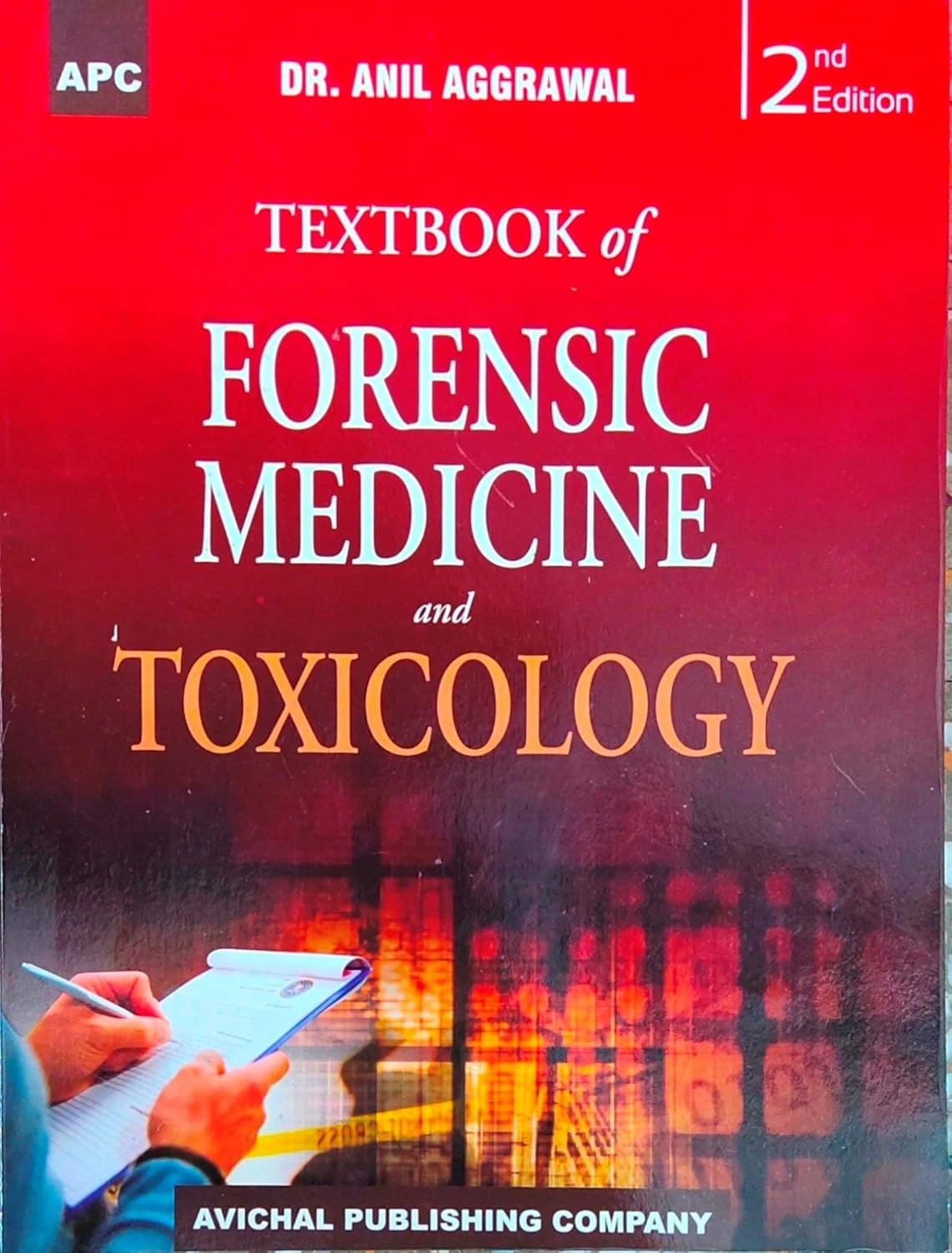
Dr. Anil Aggrawal’s “Textbook of Forensic Medicine and Toxicology” is one of the most well-regarded books in the field.
It is an authoritative and comprehensive resource, ideal for MBBS students who are ready to move beyond the basics and explore the more detailed aspects of forensic medicine and toxicology.
Detailed Coverage of Toxicology and Medico-Legal Aspects
The book offers in-depth coverage of both forensic medicine and toxicology.
It is an excellent choice for students who want to delve into the legal aspects of medical practice.
The key sections include:
- Toxicology: Dr. Anil provides extensive information about poisons, including their classification, effects, and treatment. He also covers the detection of toxins in the body and how to interpret toxicological findings in a legal context.
- Death Investigation: The book dives deeper into the processes involved in investigating deaths, including how to determine the cause of death, signs of trauma, and post-mortem changes.
- Injury Assessment: It offers comprehensive guidance on identifying, classifying, and interpreting injuries in a medico-legal context.
Considerations for Depth of Content and Student Engagement
- Advanced Topics: While the book is comprehensive, it also covers advanced topics such as the legal aspects of medical practice, the handling of evidence, and ethical issues in forensic medicine.
- Practical Application: The book includes numerous real-world examples, case studies, and illustrations that help students connect theoretical knowledge to actual forensic practice.
- Exam Preparation: The book’s clear layout and structured approach make it useful for exam preparation, as it allows students to study systematically.
This textbook is ideal for MBBS students who want to gain a deep understanding of forensic medicine and toxicology.
It is a comprehensive resource that will be valuable throughout medical school and beyond.
2) “Forensic Medicine: Principles and Practice” by Krishan Vij
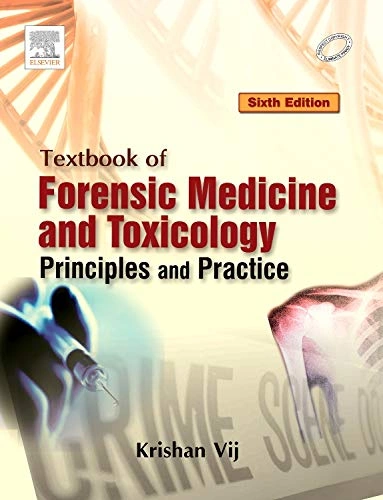
Dr. Krishan Vij’s “Forensic Medicine: Principles and Practice” is another important resource that provides an extensive overview of forensic medicine, including post-mortem techniques, injury classifications, and legal aspects.
This book is designed to help students understand how forensic principles are applied in practice.
Key Topics Covered
- Post-Mortem Examination: The book explains the techniques used during post-mortem examinations and their importance in determining the cause of death. This section covers different types of autopsies, including medicolegal autopsies and hospital autopsies.
- Injury Classification: Dr. Vij provides a detailed classification system for injuries, helping students identify and understand various types of injuries, their causes, and their relevance in legal cases.
- Medico-Legal Cases: The book delves into the medico-legal aspects of various injuries, from assault and poisoning to sexual offenses and accidents.
Why It’s Great for Students Seeking Practical Knowledge
- Clinical Focus: This book emphasizes the practical aspects of forensic medicine, making it particularly useful for students looking to apply theoretical knowledge in real-world settings.
- Clear and Accessible: Dr. Vij’s writing style is clear, making complex subjects more accessible to students.
- Illustrations and Case Studies: The inclusion of illustrations, diagrams, and case studies further enhances the reader’s understanding of forensic medicine in clinical practice.
This book is ideal for students looking for a comprehensive understanding of forensic medicine, with a special emphasis on clinical and practical aspects.
To enhance your practical understanding, consider books specifically focused on clinical practice.
Forensic Medicine Books for MBBS: Books for Clinical Practice
These books provide valuable insights into the practical application of Forensic Medicine in real-world scenarios.
“Essentials of Forensic Medicine and Toxicology” by Dr. K. S. Narayan Reddy
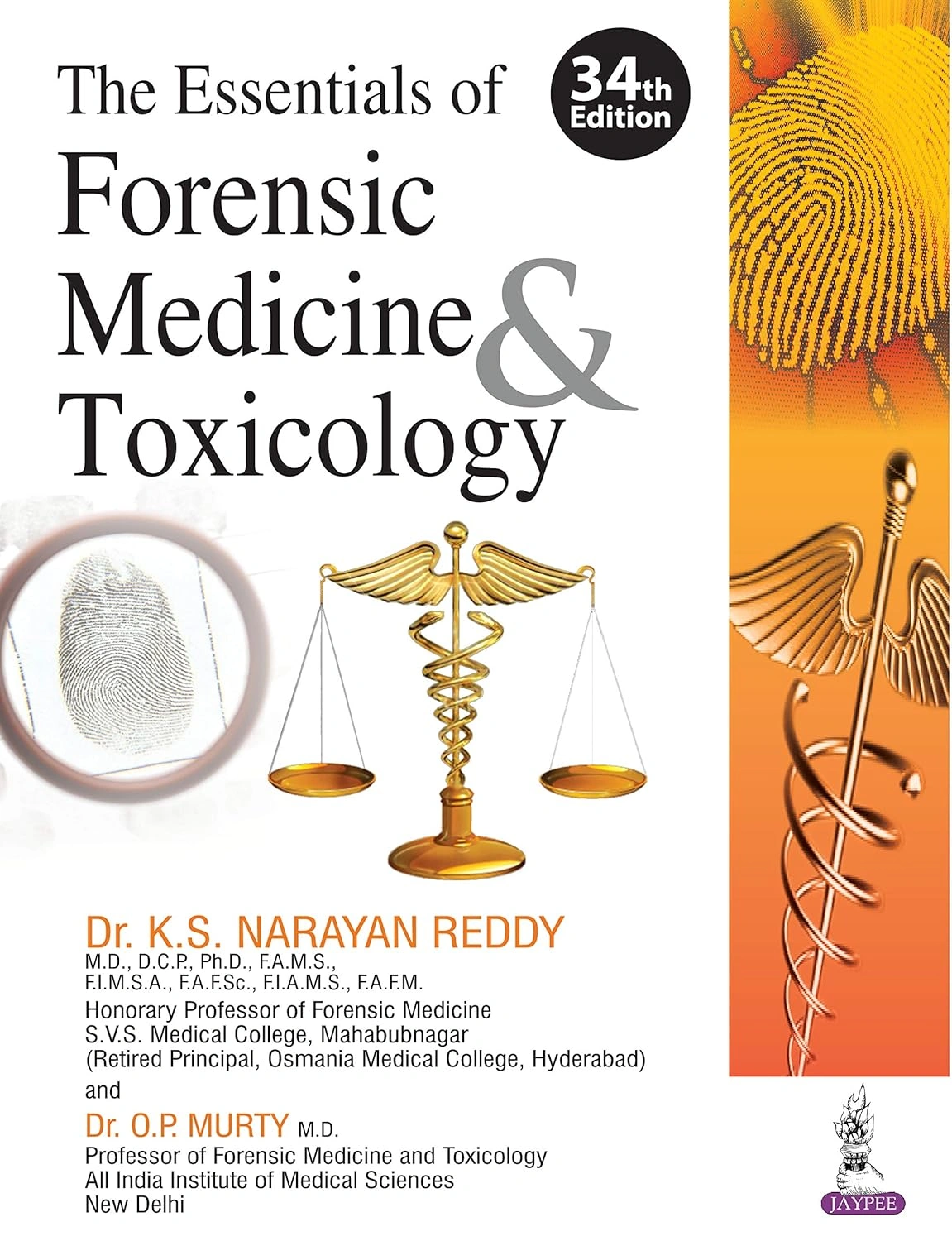
Dr. K. S. Narayan Reddy’s “Essentials of Forensic Medicine and Toxicology” is one of the most widely used textbooks for MBBS students.
Known for its concise and practical approach, this book is particularly useful for students focusing on the clinical aspects of forensic medicine.
Concise Yet Detailed: Practical Approach to Forensic Medicine
The book is designed to be both concise and comprehensive. It covers a range of topics that are essential for MBBS students, with a strong emphasis on practical application in clinical settings.
Some of the key areas the book addresses include:
- Clinical Forensic Medicine: Dr. Reddy offers practical insights into how forensic medicine is applied in clinical practice. Topics such as injury assessment, handling toxicology cases, and forensic examinations are thoroughly covered.
- Toxicology in Clinical Practice: The book discusses the diagnosis and treatment of various forms of poisoning, including drug overdoses, chemical exposure, and environmental toxins.
- Legal Aspects of Forensic Medicine: The book also covers medico-legal issues, such as documentation, reporting, and the role of medical professionals in the legal system.
Best Suited for Clinical Aspects
- Practical Focus: The book emphasizes practical skills and clinical knowledge that are necessary for handling medico-legal cases.
- Ideal for Clinical Exposure: It is an excellent resource for students who wish to focus on clinical practice in forensic medicine.
For students who are looking to enhance their clinical skills and understanding of forensic medicine, Dr. Reddy’s book is a must-read.
Toxicology is an important aspect of Forensic Medicine, and there are dedicated books available for this subject.
Forensic Medicine Books for MBBS: Books for Toxicology
These books focus on the identification and analysis of poisons and other toxic substances.
“Textbook of Forensic Medicine & Toxicology” by P. C. Dikshit
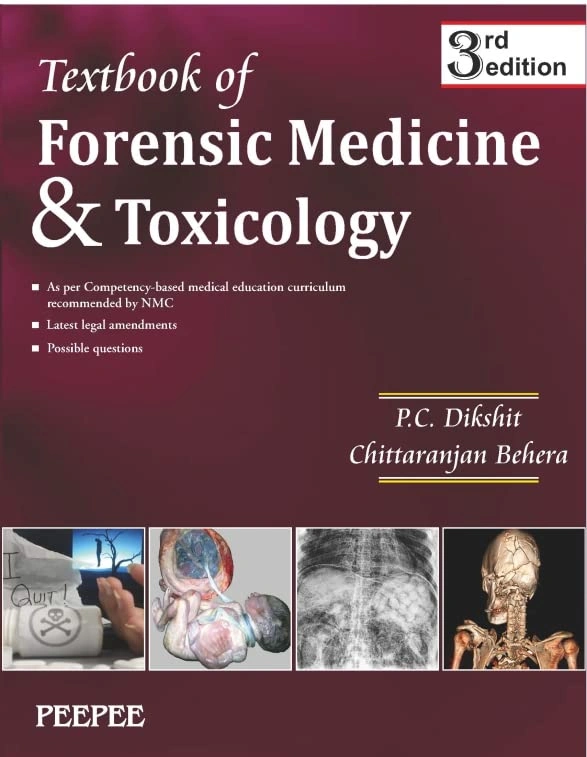
For students who are specifically interested in toxicology, P. C. Dikshit’s “Textbook of Forensic Medicine & Toxicology” is an excellent resource.
This book provides in-depth coverage of poisoning, toxic substances, and their medico-legal implications, making it essential for students specializing in toxicology.
In-Depth Coverage of Various Types of Poisoning
The book covers various types of poisoning, including:
- Acute and Chronic Poisoning: It discusses the causes, symptoms, diagnosis, and treatment of both acute and chronic poisoning.
- Types of Toxins: It offers detailed information on different toxic substances such as chemicals, drugs, alcohol, and plant toxins.
- Toxicology and Law: The book also delves into the legal implications of poisoning cases, including the role of forensic experts in toxicological investigations.
Why It’s Great for Students Interested in Toxicology
- Specialized Knowledge: The book offers specialized, detailed knowledge about toxicology, which is essential for students aiming to pursue a career in forensic toxicology.
- Comprehensive and Detailed: With its thorough coverage, it provides an authoritative reference for students looking to deepen their understanding of poisoning and toxic substances.
This book is perfect for students who are interested in toxicology as a specialized field within forensic medicine.
Visual learning is crucial in Forensic Medicine, and atlases can be incredibly helpful.
Forensic Medicine Books for MBBS: Atlases and Reference Materials
Atlases provide detailed illustrations and photographs of various forensic findings, such as injuries and post-mortem changes.
“Practical Approach for Forensic Medicine and Toxicology” by K. Tamilmani
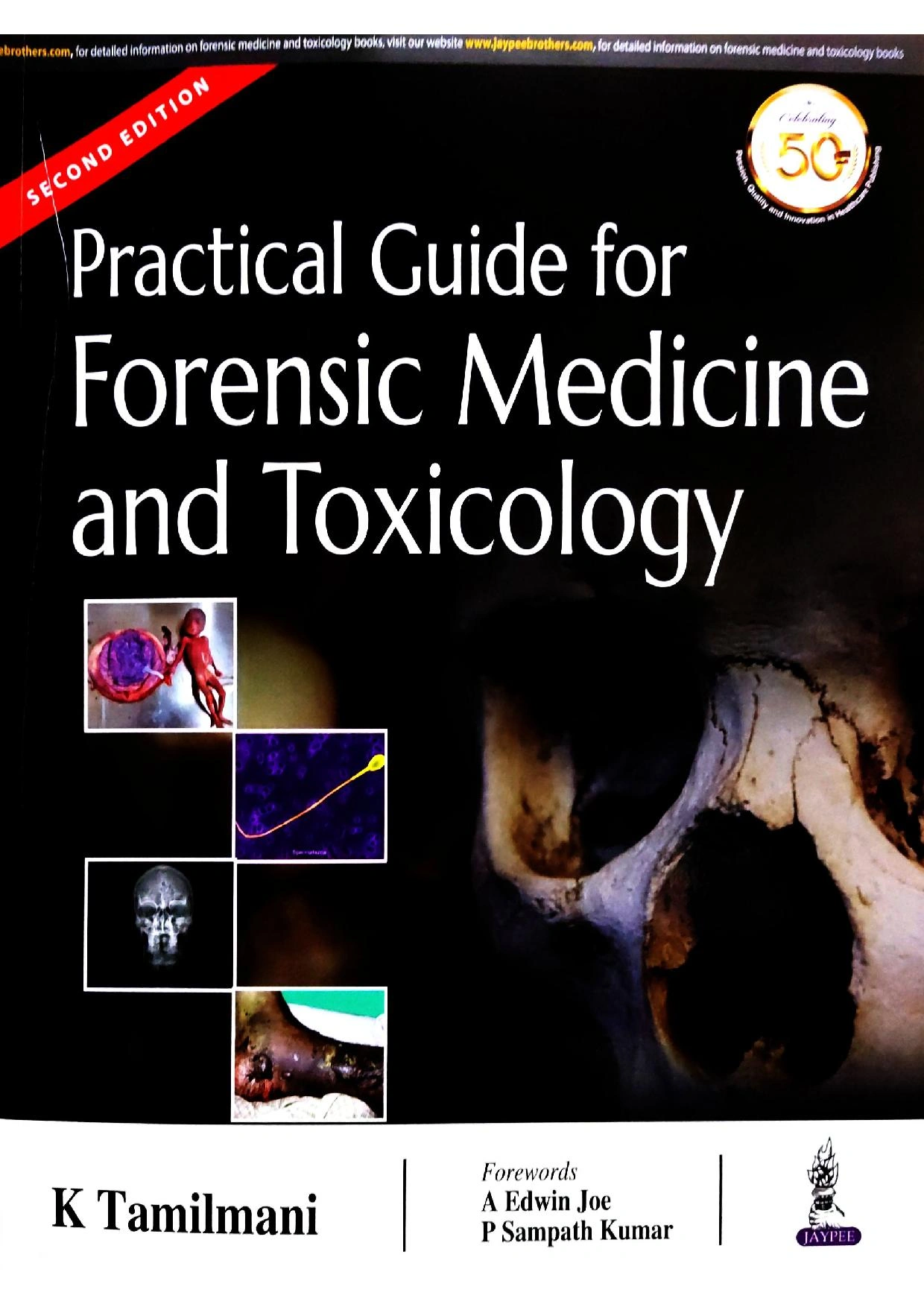
K. Tamilmani’s “Practical Guide for Forensic Medicine and Toxicology” is an atlas-style book that is ideal for students who learn best through visual resources.
This book includes numerous illustrations, case studies, and practical examples that help students better understand forensic medicine and toxicology.
Illustrations and Case Studies for Visual Learners
- Illustrations: The book includes numerous diagrams, photographs, and drawings that help students understand the anatomy of injuries, toxicological effects, and post-mortem changes.
- Real Case Studies: Case studies based on real forensic investigations provide practical insights and illustrate how forensic knowledge is applied in real life.
- Practical Approach: The focus is on practical aspects of forensic medicine, helping students learn how to apply their knowledge in clinical and legal settings.
This atlas is a great choice for visual learners and those who want to understand forensic medicine through case studies and illustrations.
To prepare effectively for exams, you can utilize case studies and exam preparation books.
Forensic Medicine Books for MBBS: Case Studies and Exam Preparation
Case studies help you apply theoretical knowledge to real-life situations. Exam preparation books offer concise summaries and practice questions.
“MCQs in Forensic Medicine” by Archana Singh
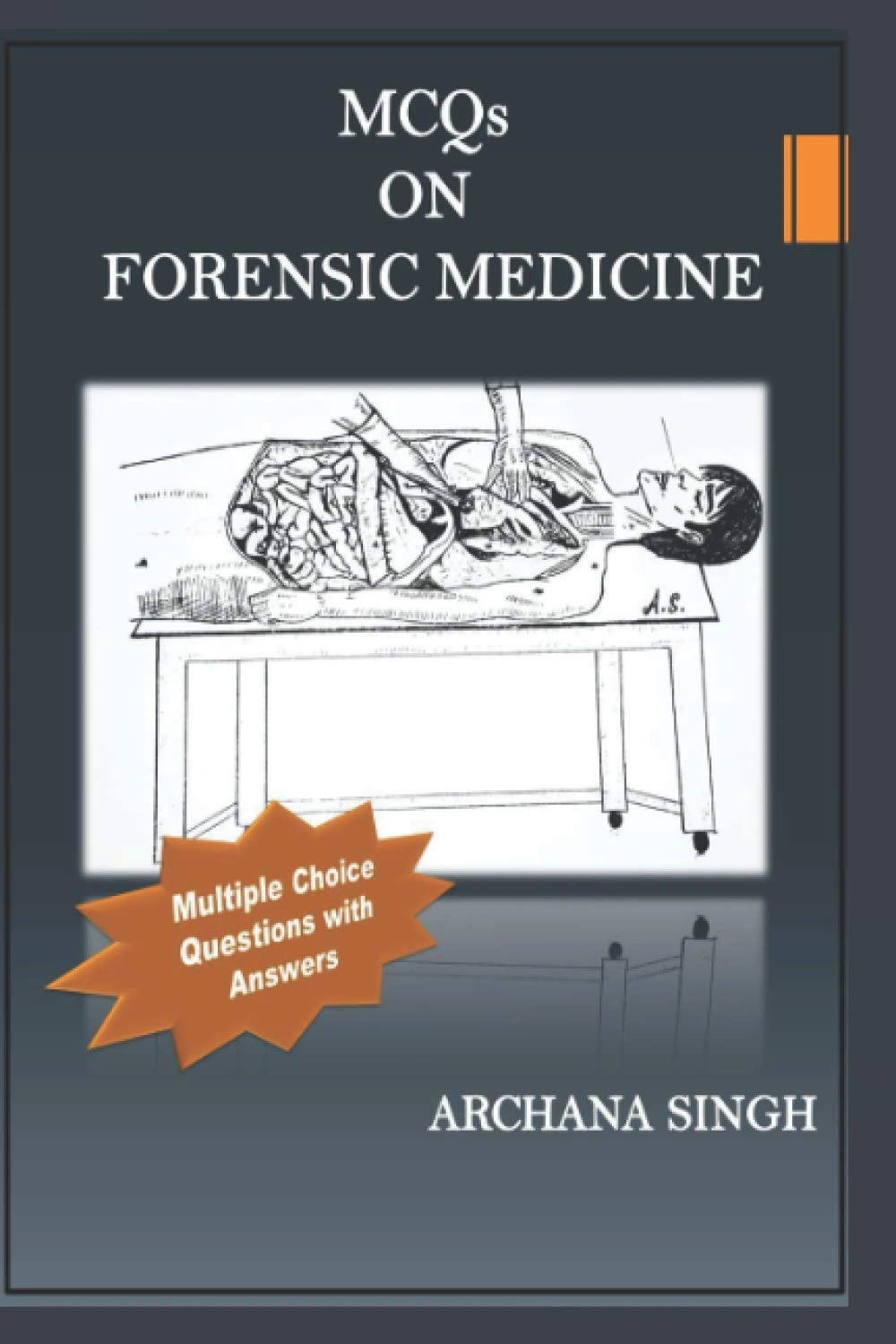
Archana Singh’s “MCQs in Forensic Medicine” is an excellent resource for students who want to test their knowledge and prepare for exams.
The book contains a large collection of multiple-choice questions (MCQs) based on topics in forensic medicine, making it ideal for self-assessment.
Benefits for Exam Preparation
- Wide Range of Questions: The book covers a wide range of topics, from toxicology and death investigations to injury classifications and legal aspects.
- Helps with Exam Readiness: By practicing these MCQs, students can familiarize themselves with the format and types of questions commonly asked in exams.
- Self-Assessment: Regular practice helps students assess their understanding and pinpoint areas that need improvement.
This book is an invaluable resource for MBBS students preparing for exams in forensic medicine.
To maximize your learning, it’s essential to adopt an effective study approach.
Recommended Study Approach for Forensic Medicine
Studying forensic medicine can be a challenging but rewarding journey for MBBS students.
The subject requires not only an understanding of medical principles but also the ability to apply those principles in a legal context.
The study of forensic medicine is a blend of theoretical knowledge and practical skills, and it demands a systematic and focused approach for mastering the vast content it covers.
Below is a recommended study approach to help students succeed in forensic medicine.
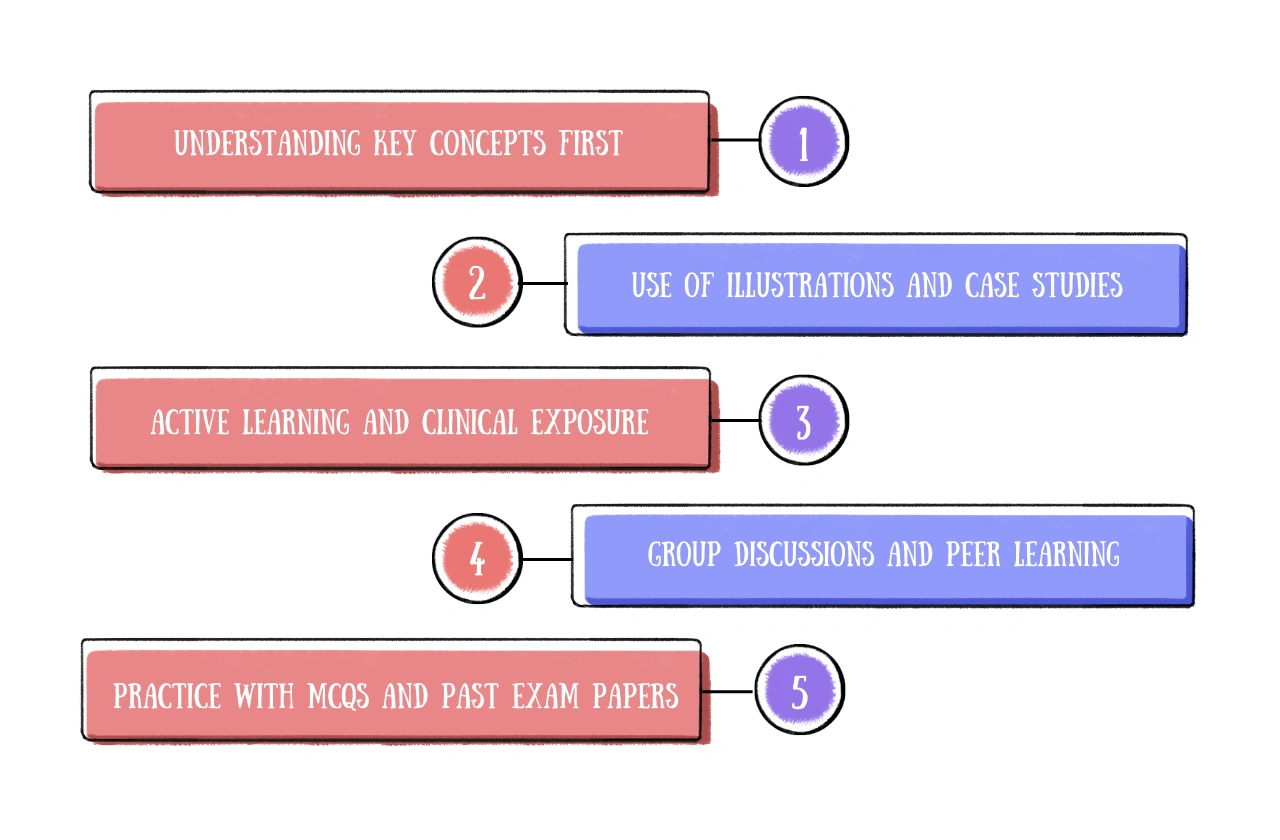
1) Understanding Key Concepts First
Forensic medicine is a subject with a wide range of topics, including death investigations, toxicology, injury assessments, and the medico-legal aspects of medical practice.
As a beginner, it is crucial to first build a strong foundation by focusing on the fundamental concepts of the subject.
- Start with Basic Principles: Before diving into the more complex topics of forensic medicine, spend time understanding the basic principles, such as the definitions of death, the types of injuries, the process of post-mortem investigations, and the medico-legal terms. A clear understanding of these foundational concepts will serve as a building block for more advanced topics.
- Medico-Legal Terminology: Familiarize yourself with the common medico-legal terms used in forensic medicine, such as “homicide,” “suicide,” “accidental death,” and “post-mortem.” Knowing the proper terminology will help you understand the more detailed aspects of the subject.
- Understand the Role of Forensic Medicine in Law: Forensic medicine plays a vital role in legal investigations, so it’s important to understand the medico-legal responsibilities of a medical professional. Knowing how forensic experts contribute to legal cases will help frame the broader context of the subject.
By building a solid understanding of the basics early on, you will be able to approach more complex topics with greater ease.
2) Use of Illustrations and Case Studies
Forensic medicine is a highly visual subject, especially when dealing with topics such as injuries, post-mortem findings, and toxicology. Visual aids like diagrams, charts, illustrations, and case studies can significantly enhance understanding.
- Utilize Atlases and Diagrams: Anatomy and injury classifications are better understood through diagrams, photographs, and illustrations. Textbooks with visual resources, such as “Forensic Medicine and Toxicology: A Practical Approach” by A. K. Boro, are particularly helpful in explaining complex topics. Pay attention to illustrations of injury patterns, anatomical structures, and toxicological effects.
- Case Studies for Real-Life Application: Forensic medicine is best understood when theoretical knowledge is connected to real-life scenarios. Case studies that present actual medico-legal situations allow you to apply your knowledge to practical examples. These case studies often describe investigations of death, poisoning, or injuries and the legal processes involved.
- Watch Videos and Demonstrations: Many universities provide video demonstrations of post-mortem procedures and toxicology investigations. These resources allow you to visually experience forensic practices, making abstract concepts more tangible.
Incorporating visual learning into your study plan will help reinforce your understanding and make the material more engaging.
3) Active Learning and Clinical Exposure
Forensic medicine is a subject that requires practical, hands-on experience to truly grasp. Active learning, which includes clinical exposure and interaction with real forensic cases, is an important part of your study routine.
- Participate in Practical Sessions: Whenever possible, attend autopsies and other forensic medical procedures. Observing experienced forensic professionals at work provides invaluable insights into how theory is applied in practice. Whether it’s learning about post-mortem techniques, examining injuries, or discussing toxicological cases, clinical exposure is essential to developing a deeper understanding.
- Shadow Forensic Experts: If opportunities are available, try to shadow forensic pathologists, legal medical experts, or toxicologists. This exposure allows you to see how forensic medicine is applied in real investigations, as well as how medical professionals interact with the legal system. You will gain insights into the role of forensic experts in courts and legal investigations.
- Visit Morgues and Courts: Some universities organize field visits to morgues or courtrooms, which offer a first-hand look at how forensic evidence is handled and presented. Observing court cases that involve forensic medical evidence helps you understand the intersection of medicine and law, which is critical in this subject.
Clinical exposure and active learning will help you gain a practical perspective on forensic medicine, making it easier to understand and retain complex topics.
4) Group Discussions and Peer Learning
Forensic medicine is a subject that often involves complex cases and controversial issues.
Engaging with peers in group discussions or collaborative study sessions can help clarify doubts, reinforce learning, and encourage a deeper understanding of difficult concepts.
- Collaborative Study Groups: Study groups allow you to exchange ideas and discuss topics in depth. By teaching others what you have learned, you reinforce your own knowledge. Group discussions also provide the opportunity to approach problems from different perspectives, which can help clarify difficult or confusing topics.
- Discussing Case Studies: Participating in discussions around real or hypothetical forensic cases helps you practice analyzing situations, making judgments, and understanding legal implications. Discussing cases in a group setting can lead to different interpretations, helping you gain new insights.
- Ask Questions: Don’t hesitate to ask your peers or instructors questions about aspects of forensic medicine that you find confusing. Chances are, other students have the same doubts, and discussing these questions will deepen everyone’s understanding.
Peer learning and group discussions can enhance comprehension and build a collaborative learning environment, which is especially beneficial in a subject as complex as forensic medicine.
5) Practice with MCQs and Past Exam Papers
One of the most effective ways to prepare for exams in forensic medicine is through active practice. Using multiple-choice questions (MCQs) and past exam papers can help you assess your knowledge and test your understanding of key concepts.
- Use MCQ Books: Books like “MCQs in Forensic Medicine” by Archana Singh are excellent resources for practicing forensic medicine-related questions. Regularly working through MCQs will help you familiarize yourself with the types of questions that may appear in exams and will allow you to assess your level of preparedness.
- Review Past Papers: Past exam papers are an invaluable resource for understanding the format and style of questions that may be asked in your exams. Reviewing these papers helps you identify recurring topics and focus on areas that may require further revision.
- Simulate Exam Conditions: Practicing MCQs under timed conditions simulates the pressure of an actual exam, helping you manage time effectively and perform well under stress.
Incorporating MCQs and past exam papers into your study plan is an excellent way to prepare for exams, ensure you understand key concepts, and build exam-taking strategies.
With consistent effort and the right resources, you can excel in Forensic Medicine.
Tips for Succeeding in Forensic Medicine
Forensic medicine is a demanding yet fascinating subject for MBBS students. It requires a solid understanding of both medical and legal principles, as well as the ability to think critically and analytically.
Here are some practical tips that can help you succeed in this subject and make the most of your studies:
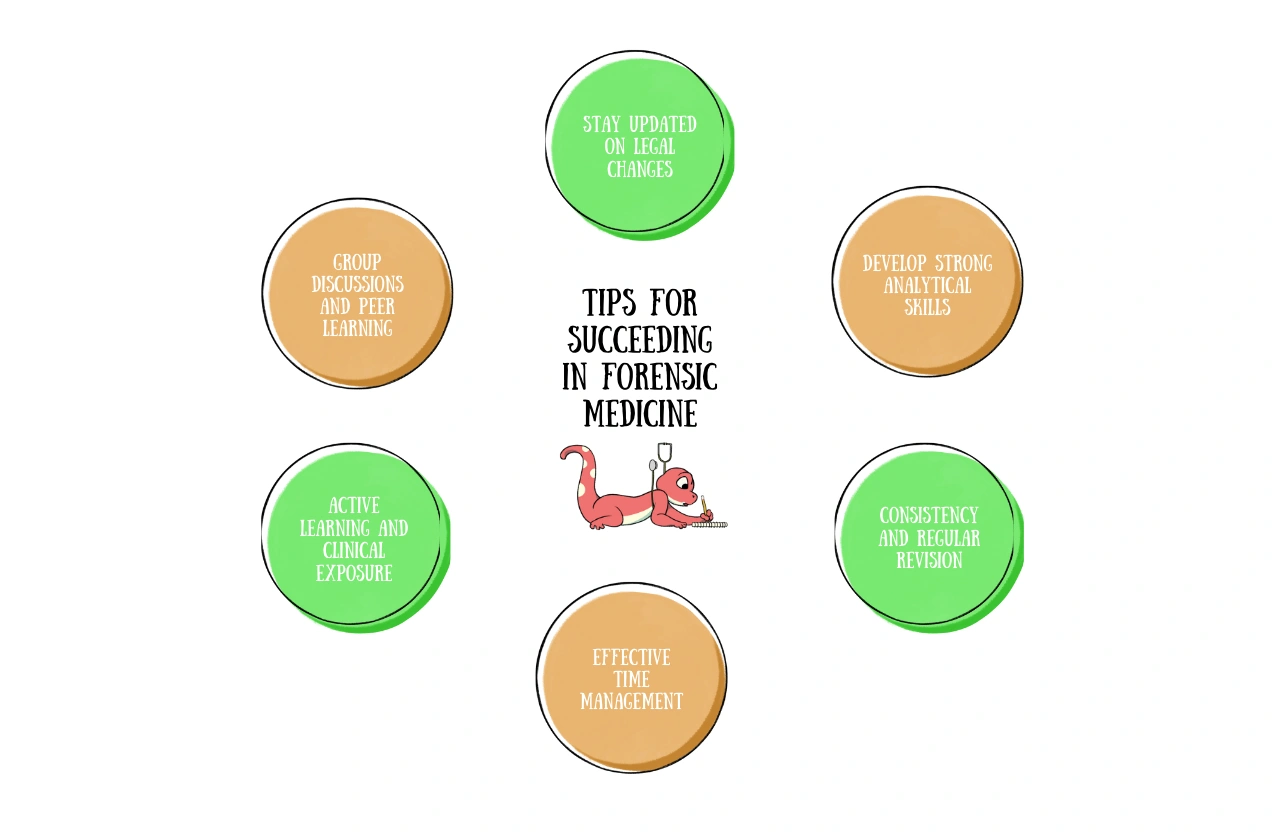
1) Stay Updated on Legal Changes
Forensic medicine is deeply intertwined with the legal system. Laws and regulations related to medico-legal practices, including post-mortem procedures, the handling of toxicological evidence, and the medico-legal role of medical professionals, can change over time.
Staying updated on these legal changes is essential for students, as the legal landscape is a key part of forensic medicine.
- Follow Legal Updates: Keeping an eye on changes to criminal and civil law, particularly those that affect forensic investigations, will help you understand how medical evidence is interpreted in a legal context.
- Attend Seminars and Webinars: Participate in forensic medicine-related seminars, webinars, and workshops that focus on recent legal developments and case studies. Many medical universities and legal institutions offer seminars that are specifically designed for medical professionals in the forensic field.
- Study Legal Texts: Occasionally read legal texts or journals that explain how the law applies to medical cases, especially those dealing with death investigations, injuries, and toxicology.
Being informed about the legal aspects will not only improve your understanding of the subject but also give you a broader perspective on how forensic medicine operates within the judicial system.
2) Develop Strong Analytical Skills
One of the core skills required in forensic medicine is the ability to analyze complex medical and legal information.
Forensic medical professionals often work with incomplete or ambiguous data and need to use critical thinking to draw conclusions.
This skill is necessary not only for case analysis but also for interpreting medical evidence in a way that is legally acceptable.
- Case Analysis: When studying forensic medicine, always approach case studies with a problem-solving mindset. Look for patterns in the evidence, ask questions, and think critically about how each piece of information fits into the bigger picture.
- Injury and Death Analysis: For example, when learning about different types of injuries, think about how they relate to the cause of death or how they may have occurred in real-life scenarios. Understanding the mechanisms of injury, the timing of injuries, and their potential legal consequences is crucial.
- Toxicology Problem-Solving: In toxicology, critical thinking is key to identifying symptoms, diagnosing poisoning, and understanding the effects of various toxins. Forensic toxicologists often have to differentiate between various poisons that may present with similar symptoms.
Incorporating critical thinking into your study routine will help you excel in the subject and prepare you for real-world forensic investigations, where analytical reasoning is essential.
3) Consistency and Regular Revision
Forensic medicine covers a wide array of topics, from post-mortem examinations and injury classifications to toxicology and legal issues.
The sheer volume of information can be overwhelming, so regular revision is necessary to retain key concepts and information.
- Plan Your Study Schedule: Organize your study time to focus on specific topics, revisiting each one periodically to reinforce your understanding. Consistent revision prevents information overload and ensures that you retain what you’ve learned over time.
- Create Flashcards: Flashcards can be especially helpful for memorizing medical terms, toxicology facts, and injury classifications. Regularly reviewing these cards will keep essential information fresh in your mind.
- Summarize and Write Notes: After reading a chapter or completing a section, summarize the key points in your own words. This not only reinforces your learning but also helps you identify areas that need further clarification.
Setting aside time for regular revision throughout the semester ensures that you are consistently engaging with the material, making it easier to recall information during exams and practical assessments.
4) Effective Time Management
Balancing forensic medicine with other subjects in the MBBS curriculum can be challenging, especially when each subject demands your attention.
Effective time management is critical to avoid feeling overwhelmed and ensure that you allocate sufficient time to each subject.
- Prioritize Based on Importance: Allocate more time to difficult or complex topics that require deeper understanding, such as toxicology, autopsy techniques, or injury classifications. Spend less time on areas that you already feel comfortable with, but don’t neglect them completely.
- Use Study Blocks: Break your study time into focused blocks (e.g., 45–60 minutes) followed by short breaks. This approach helps maintain concentration and prevents burnout.
- Combine Theoretical and Practical Learning: Balance reading textbooks with practical exposure, such as observing autopsies or attending medico-legal seminars. Time spent in practical learning is invaluable and will reinforce the theoretical knowledge you gain from textbooks.
By managing your time effectively, you will ensure that you not only stay on top of your forensic medicine studies but also have the time to focus on other important subjects.
5) Active Learning and Clinical Exposure
Forensic medicine is a subject best learned through active engagement and hands-on experience.
While reading textbooks and attending lectures will give you a solid foundation, clinical exposure is key to truly understanding how forensic medicine is applied in real-world scenarios.
- Attend Post-Mortem Examinations: If possible, participate in or observe post-mortem examinations, as this is a crucial aspect of forensic practice. Observing experienced professionals will give you insight into how forensic medicine is applied in real cases.
- Shadow Forensic Experts: Seek opportunities to shadow forensic pathologists, toxicologists, or legal medical professionals to learn how forensic medicine is integrated into the legal process.
- Visit Courts or Morgues: Attending legal medical seminars or visiting morgues can provide real-life context and deepen your understanding of the role forensic medicine plays in criminal and civil law.
Practical exposure helps you bridge the gap between theory and practice. It allows you to apply what you’ve learned in textbooks to actual forensic situations, enhancing both your knowledge and confidence.
6) Group Discussions and Peer Learning
Group discussions are an effective way to enhance your understanding of forensic medicine.
Discussing complex topics with your peers can provide different perspectives and clarify doubts that you may have.
It also allows you to learn from others’ experiences, particularly if your peers have firsthand knowledge of forensic cases.
- Study Groups: Form a study group with classmates and set aside time for regular discussions on forensic medicine topics. This will give everyone a chance to review material, share ideas, and address difficult concepts together.
- Case Discussions: Work together to discuss real or hypothetical forensic cases. Try to analyze the cause of death, classify injuries, and determine the potential toxicological implications of the case. Group discussions can help everyone build a deeper understanding of how forensic medicine is applied in practice.
- Peer Teaching: Teaching a concept to a peer is a great way to reinforce your own understanding. If you feel confident in a particular area, offer to explain it to classmates who might be struggling with the same topic.
Collaborative learning not only improves your understanding but also fosters a sense of camaraderie and motivation among classmates, making the learning process more engaging and effective.
By diligently studying and applying these tips, you can build a strong foundation in Forensic Medicine and achieve academic success.
Conclusion
Forensic medicine is an essential and multifaceted field that plays a critical role in linking medical science with the legal system.
Mastering forensic medicine requires a blend of theoretical knowledge, clinical experience, and a solid understanding of legal principles.
The books discussed in this article provide a comprehensive range of resources, from beginner-friendly texts to more advanced materials, helping students at every stage of their studies.
Additionally, resources focused on clinical practice, MCQs for exam preparation, and books with case studies and illustrations provide well-rounded support for students.
To succeed in forensic medicine, it’s important to use a structured study approach, balancing theoretical learning with practical experience, active engagement with case studies, and regular revision.
By combining these resources and strategies, MBBS students can build the expertise necessary to excel in forensic medicine and contribute effectively to both medical and legal investigations.

